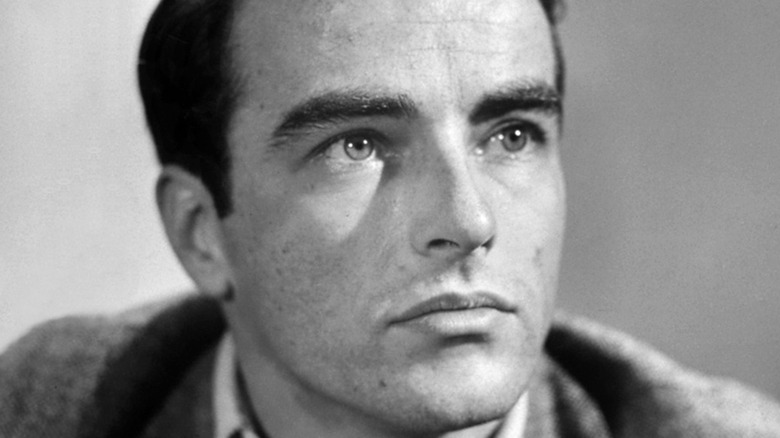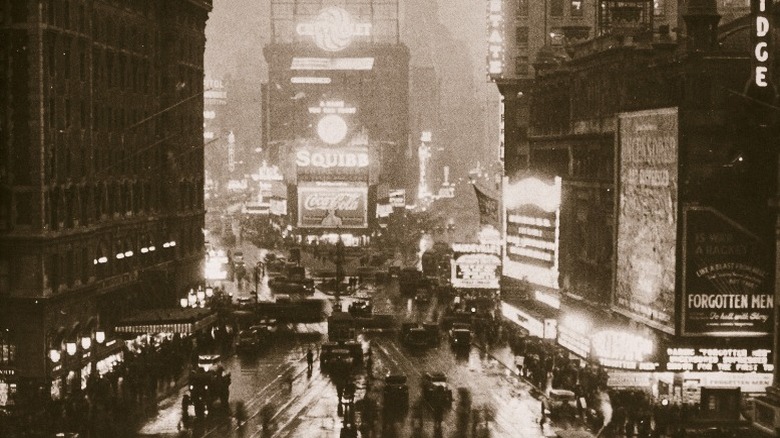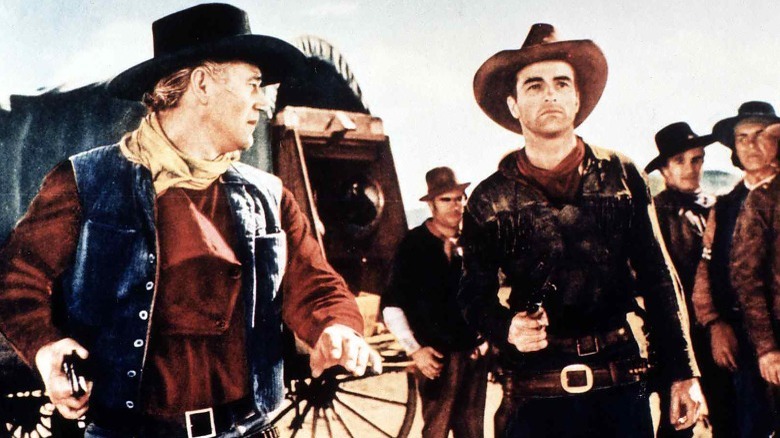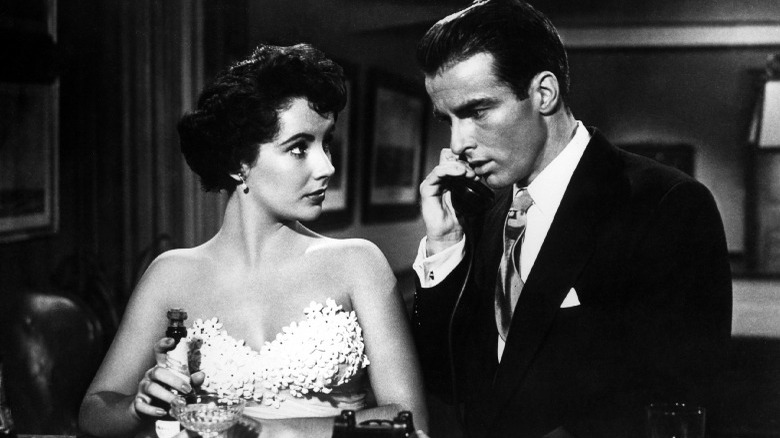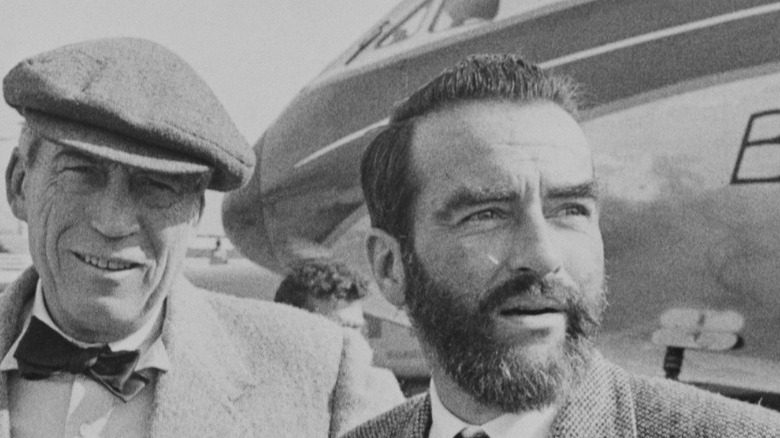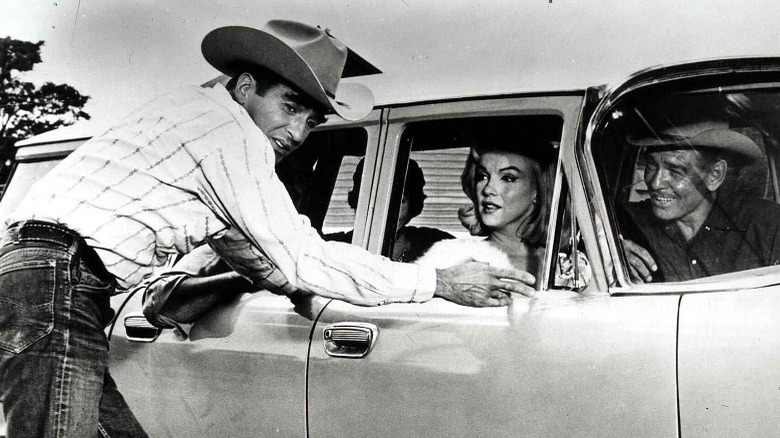Montgomery Clift's Disastrous Car Wreck Changed His Career Forever
Actor Montgomery Clift is best remembered for his striking good looks and his compelling dramatic performances in such films as "A Place in the Sun" (1951) and "From Here to Eternity" (1953), per IMDb. He earned an impressive four Academy Award nominations during his career. Clift was also a Hollywood maverick of sorts, choosing to remain independent at a time when most actors were under contract to the movie studios, per Vanity Fair. For him, the freedom to be selective about his roles was more important than money or fame.
Clift's life was derailed, however, by a terrible car accident in 1956. He was in the middle of making "Raintree County," a movie that reunited him with his "A Place in the Sun" co-star Elizabeth Taylor, and his accident took place after Clift had been a guest at Taylor's Beverly Hills home. This tragedy changed the course of his career and may have hastened his death a decade later.
Clift's promising early career
Born Edward Montgomery Clift on October 17, 1920, in Omaha, Nebraska, he found his love of theater early on (via the Los Angeles Times). Clift had traveled extensively with his family while growing up, and it was while he and the family were in Florida that he landed his first part, per Britannica. He was only 12 years old when he appeared in a production of "As Husbands Go" in Sarasota. It wasn't long before he made his way to New York City.
Clift made his Broadway debut in "Fly Away Home" in 1935, according to the Irish Times. Later that same year, he appeared in Cole Porter's "Jubilee." Clift shared the stage with some of the leading performers of the day, including Alfred Lunt and Lynn Fontanne in "There Shall be No Night" (via Playbill) and Tallulah Bankhead in "The Skin of Our Teeth" (also via Playbill), both in 1942. He even appeared in the original production of Tennessee Williams' play "You Touched Me" (1945) (per Playbill). It wasn't long before he found his way to the big screen.
Clift's first major films
Clift (per IMDb) made a big splash with his first two films with leading roles in "The Search" and "Red River," both released in 1948. He earned his first Academy Award nomination for best actor for "The Search," and yet "Red River" seems to be better remembered these days. "Red River," which has become a classic western, featured Clift starring opposite John Wayne. He played the adopted son of Wayne's character, and the two brought two different images of maleness to the big screen, as The Guardian newspaper pointed out. Wayne portrayed a hard and brutal father and boss while Clift played a gentler and more vulnerable son.
In "The Heiress" (1949), Clift took the role of romantic lead, playing up his charismatic good looks. He and his co-star Olivia de Havilland made an appealing couple in this film adaptation of a Henry James novel. But it was his next pairing with Elizabeth Taylor that proved to be his most dynamic on-screen.
Clift nearly died in the car accident
Clift first met Elizabeth Taylor in 1949, and she felt an immediate attraction to him, according to People magazine. Her romantic interest in him evolved into an intense friendship after he revealed her that he was gay (some sources say he was bisexual). At the time, Clift was encouraged to hide his sexuality because it would destroy his career as a leading man in Hollywood. He and Taylor definitely had chemistry while making "A Place in the Sun" (1951), and their connection was so compelling that their co-star Shelley Winters was convinced that they were involved.
Clift reunited with Taylor for "Raintree County," a Civil war era romantic drama. During the filming of the movie in 1956, Taylor and her then-husband, Michael Wilding, had guests over for a party one night. Clift was there, as were actors Kevin McCarthy and Rock Hudson, and Hudson's wife, Phyllis Gates, per Vanity Fair. The story of Clift's devastating car crash varies somewhat from one account to the next. Some sources have the crash occurring when Clift was leaving the event, while others state he was on his way there.
Car crash left Clift with lifelong problems
Whether he was leaving from or arriving at Taylor's home, it is an undisputed fact that Clift drove his car into a telephone pole and suffered horrific injuries, including significant facial damage (via Vanity Fair). McCarthy had been driving in front of Clift when the crash occurred, and he thought that Clift had been killed. A short while later, Taylor and some of the others rushed to the scene of the accident. According to some reports, she reportedly held Clift and removed two teeth that had fallen out in the crash from his throat, as they were causing him to choke. Taylor also threatened to end any photographer's career who dared to take a picture of the seriously wounded Clift.
It took Clift months to recover from his injuries. He needed a lot of plastic surgery to repair his face, according to the Los Angeles Times. Clift required intensive physical therapy as well. When he resumed filming on "Raintree County," he was a different man, one left in chronic pain because of the accident. Audiences turned out to see the movie and to catch a glimpse of the before and after versions of Clift on the big screen.
Clift's career after the accident
After the car accident, Clift only took on a few more movie roles. His heavy drinking had already been a problem before his crash and the addition of taking painkillers afterwards only accelerated his decline, according to Vanity Fair. It all took a toll on him physically and mentally, and movie studios became wary of hiring him. Elizabeth Taylor used her clout to get Clift cast on "Suddenly, Last Summer" (1959) with mixed results. He struggled to make through some of the longer scenes.
Clift gave a stronger performance in "The Misfits" (1961), a John Huston contemporary western that proved to be the last film for both his co-stars, Clark Gable and Marilyn Monroe. That same year, he had a small but powerful role in "Judgment at Nuremberg," playing Polish man who testified during the Nazi trials about being sterilized, per the Los Angeles Times. Clift did the film without pay because he just wanted to tackle this character. He earned an Academy Award nomination for his work, displaying some of his old acting chops. Clift, however, was so unsteady and unstable while filming "Freud" (1962) that his movie studio brought a lawsuit against him (via Vanity Fair).
In 1966, Clift finished filming his last project, "The Defector," and returned to his New York City apartment. The actor died there on July 23, 1966, of an apparent heart attack. His body was discovered by his assistant. Clift was only 45 years old when he died.
